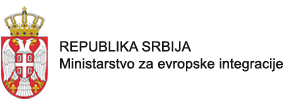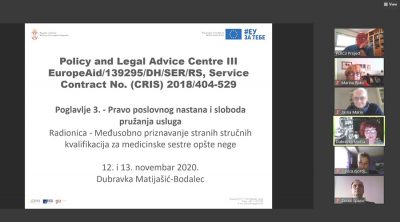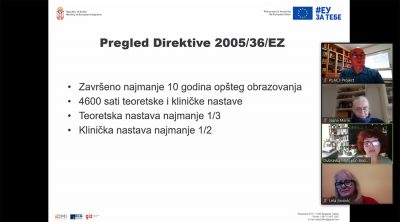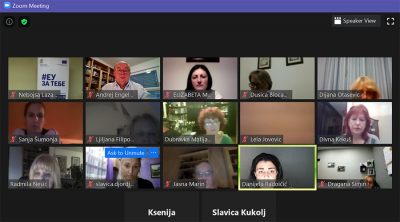Recognition of professional qualifications for medical nurses

Two-day workshop on the recognition of professional qualifications for medical nurses was held on 12-13 November 2020. Representatives of line ministries, educational institutions as well as professional associations took part in the workshop.
Policy and Legal Advice Centre (PLAC III) has project provided assistance to the Ministry of Education, Science and Technological Development in further harmonisation of the national legislation with the relevant Union acquis, that is the Directive on the recognition of professional qualifications (Directive 2005/36/EC). Mutual recognition of professional qualifications is part of the Negotiatin Chapter 3 (Right of establishment and freedom to provide services). The adoption of the Law on Regulated Professions and Recognition of Qualifications, as recommended by the European Commission, is underway. PLAC III project assistance focused on further harmonisation of the national legislation and drafting of a training curriculum for medical nurses of general care aligned with the Directive.
Project expert Dubravka Matijašić Bodalec presented to the workshop participants the relevant Directive that stipulates that a medical nurse must have completed at least 10 years of general education and at least 4,600 hours of theoretical and clinical training. In the curriculum, the duration of the theoretical training must represent at least one-third and the duration of the clinical training at least one half of the minimum duration of the training.
EU directives recognise only the qualification of a medical nurse of general care and that will be the subject of negotiations with EU, Matijašić Bodalec said. The Directive on the recognition of professional qualifications is aligned with the Bologna Declaration and has introduced ECTS credits which will be a base for documenting of a fulfilment of a requirement of minimum of 4,600 hours for the recognition of medical nurse qualification. For nurses of other profiles – paediatric, dental and nurse educators, there is an option of narrower orientation after education, while gynaecological-obstetric nurses will be part of special negotiations on midwives.
A draft curriculum for general care nurses in line with the Directive, which defines subjects that must be included in theoretical training as well as what clinical training must include was presented. The project expert shared Croatia’s experiences during the negotiations. The two-day workshop was held online, with the participation of representatives of the Ministry of Education, Science and Technological Development, the Ministry of Trade, Tourism and Telecommunications, the Qualifications Agency and the College of health vocational studies during the first day and representatives of educational institutions from all over Serbia and the Association of Health Workers on the second day.
Relevant EU legislation:
Photo gallery
Recent Posts

Notice
9. April 2024.

The fourth project brochure published
29. March 2024.

The last meeting of the Steering Committee
28. March 2024.
Negotiation chapters
- Chapter 1: Free movement of goods
- Chapter 3: Right of establishment and freedom to provide services
- Chapter 8: Competition policy
- Chapter 9: Financial services
- Chapter 10: Information society and media
- Chapter 11: Agriculture and rural development
- Chapter 12: Food safety, veterinary and phytosanitary policy
- Chapter 13: Fisheries
- Chapter 15: Energy
- Chapter 16: Taxation
- Chapter 27: Environment
- Chapter 28: Consumer and health protection
- Chapter 32: Financial control
- Chapter 33: Financial and budgetary provisions








